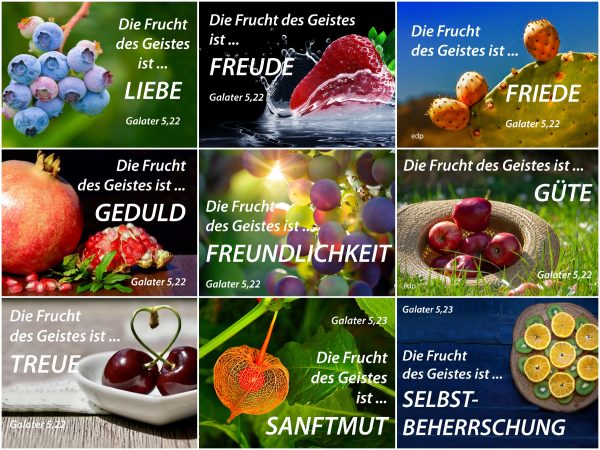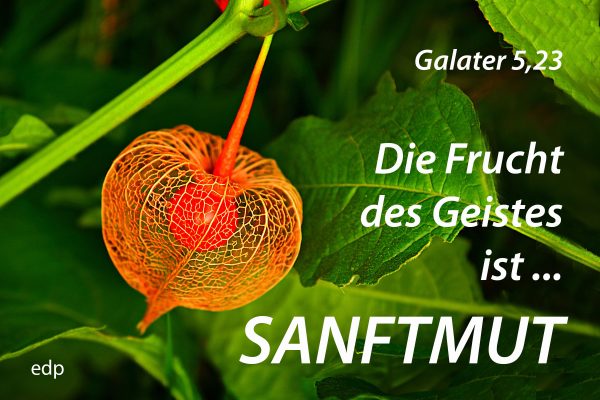 [nx_spacer size=”10″]Neun kurze Beiträge über die Frucht des Geistes / Nine short articles about the fruit of the Spirit / Nueve artículos breves sobre el fruto del Espíritu
[nx_spacer size=”10″]Neun kurze Beiträge über die Frucht des Geistes / Nine short articles about the fruit of the Spirit / Nueve artículos breves sobre el fruto del Espíritu
Schlagwort-Archive: Frucht des Geistes
Nur Fassade? (Die Frucht des Geistes 9)

[nx_spacer size=”5″]Die Frucht des Geistes ist … SELBSTBEHERRSCHUNG (Galater 5,23)
Selbstbeherrschung lernen: Als ich diese zwei Wörter im Computer eingab, meldete Google 237.000 Treffer (in 0,45 Sekunden). Es ging um fünf Wege zur Selbstbeherrschung, drei Schritte zu mehr Selbstkontrolle, die sechs besten Techniken zur Selbstbeherrschung, in fünf Minuten Selbstkontrolle lernen …
Das ist etwas ganz anderes als das Angebot Gottes, diese wunderbare Wesenseigenschaft durch seinen Geist in uns zu entwickeln. Stell dir vor, Selbstbeherrschung wäre durch eigene Anstrengung machbar. Was wäre dann, wenn wir alt und gebrechlich würden und nicht mehr über die Willenskraft jüngerer Jahre verfügten? Dann käme heraus: Unsere Selbstbeherrschung war Fassade, war nichts anderes als Übung und starker Willen. Und dann käme unsere wahre, bis dahin in Schach gehaltene Natur, zum Vorschein. Welch eine Tragik! Was aber der Geist Gottes bewirkt, d.h. von innen verändert, das ist echte Frucht. Und die bleibt!
Mit diesem neunten Beitrag endet diese Serie über die Frucht des Geistes. Auf Google erschien in diesem Zusammenhang der Eintrag „Frucht des Geistes – VERGRIFFEN“. Gott sei Dank handelt es sich nur um den Titel eines Buches, das nicht mehr lieferbar ist. Die Frucht des Geistes mit ihren neun Facetten ist und bleibt „lieferbar“. Wenn wir mit Jesus Christus verbunden bleiben, erfüllt er sein Versprechen: „Ich bin der Weinstock, ihr seid die Reben. Wer in mir bleibt und ich in ihm, der bringt viel Frucht; denn ohne mich könnt ihr nichts tun.“ (Johannes 15,5)
Alle neun Beiträge:
- Nicht machbar: Liebe! (LIEBE)
- Mehr als nur Fröhlichkeit (FREUDE)
- Der Sturm im Herzen (FRIEDE)
- Warten können (GEDULD)
- Auf Augenhöhe (FREUNDLICHKEIT)
- Feindseligkeit besiegen (GÜTE)
- Gesucht: Treue! (TREUE)
- Nur für Mutige (SANFTMUT)
- Nur Fassade? (SELBSTBEHERRSCHUNG) – diese Seite
![]()
The fruit the Holy Spirit is … SELF-CONTROL (Galatians 5:23)
Foto
Learning self-control: When I entered these words (in German) into the computer, Google reported 237,000 hits (in 0.45 seconds). It was about five ways to self-control, three steps to more self-control, the six best techniques for self-control, learning self-control in five minutes…
This is something completely different from God’s promise to develop this wonderful character trait in us through His Spirit. Imagine that self-control would be possible through our own efforts. What would happen if we became old and frail and no longer had the willpower of younger years? Then it would come out that our self-control was a façade, was nothing but practice and strong will. And then our true nature, hitherto kept in check, would emerge. What a tragedy! But what the Spirit of God does, that is, changes from within, is true fruit. And it remains.
With this ninth contribution this series on the fruit of the Spirit ends. In this context the entry “Fruit of the Spirit – OUT OF STOCK” appeared on Google. Thank God it is only the title of a book that is no longer available. The fruit of the Spirit with its nine facets is and continues to be “available”. If we remain united with Jesus Christ, he fulfils his promise: “I am the vine. You are the branches. If anyone remains joined to me, and I to him, he will bear a lot of fruit. You can’t do anything without me.“ (John 15:5)
![]()
El fruto del Espíritu es … DOMINIO PROPIO (Gálatas 5:23)
Foto
Aprendiendo dominio propio: Cuando introduje estas palabras (en alemán) en el ordenador hoy, Google informó de 237.000 resultados (en 0,45 segundos). Se trataba de cinco formas de autocontrol, tres pasos para un mayor autocontrol, las seis mejores técnicas de autocontrol, aprender el autocontrol en cinco minutos…
Esto es algo completamente diferente de la oferta de Dios para desarrollar este maravilloso rasgo de carácter a través de Su Espíritu en nosotros. Imagina que el dominio propio pudiera conseguirse por nuestros propios esfuerzos. ¿Qué pasaría cuando envejeciéramos y fuéramos frágiles y ya no tuviéramos la fuerza de voluntad de los años más jóvenes? Entonces saldría a la luz que nuestro dominio propio era una fachada, el resultado de mucha práctica y fuerte voluntad. Entonces nuestra verdadera naturaleza, hasta ahora mantenida en jaque, emergería. ¡Qué tragedia! Pero lo que el Espíritu de Dios hace, es decir, cambiarnos desde adentro, es el verdadero fruto. Y ese fruto no desaparecerá.
Con esta novena contribución termina esta serie sobre el fruto del Espíritu. En este contexto la entrada “Fruto del Espíritu – AGOTADO” apareció en Google. Gracias a Dios que sólo se trataba del título de un libro que ya no está disponible. El fruto del Espíritu con sus nueve facetas es y sigue siendo “disponible”. Si permanecemos unidos a Jesucristo, él cumplirá su promesa: “Yo soy la vid y vosotros sois las ramas. El que permanece en mí, como yo en él, dará mucho fruto; separados de mí no podéis hacer nada.” (Juan 15:5)
Nur für Mutige: Sanftmut (Die Frucht des Geistes 8)

[nx_spacer size=”5″]Die Frucht des Geistes ist … SANFTMUT (Galater 5,23)
Zu dieser achten Facette der Frucht des Geistes habe ich ein schönes Gebet von Pfarrer Christoph Fischer gelesen:
Heiliger Geist,
komm, lass die Frucht der Sanftmut
in mir wachsen.
Sanft bin ich schon manchmal,
vielleicht zu sachte und zurückhaltend.
Gib mir den Mut, den Mund aufzumachen,
auch wenn es nicht allen gefällt;
meine Hände aufzumachen,
um Andersdenkende zu umarmen
und mein Herz aufzumachen,
wenn es sich einmauern will.
Mut habe ich schon manchmal,
vielleicht zu stürmisch und unüberlegt.
Gib mir die Sanftheit,
andere nicht nur zuzutexten sondern zu hören,
was zwischen den Zeilen gesagt wird;
anderen meine Position nicht über den Kopf zu hauen,
sondern zu verstehen, was sie antreibt;
nicht nur für meine Position überzeugend einzustehen,
sondern von anderen zu lernen.
Heiliger Geist,
komm, lass die Frucht der Sanftmut
in mir wachsen.
(Text: https://tinyurl.com/sanftmut)
![]()
The fruit the Holy Spirit produces is … GENTLENESS (Galatians 5:23)
Foto
To this eighth facet of the fruit of the Spirit I read a beautiful prayer by Pastor Christoph Fischer:
Holy Spirit,
Come, let the fruit of gentleness
grow inside me.
I can be gentle sometimes,
maybe too gentle and reserved.
Give me the courage to open my mouth,
even if not everyone likes it;
to open my hands,
to embrace those who think differently
and open up my heart,
if it wants to wall itself in.
I do have courage sometimes,
maybe too impetuous and imprudent.
Give me the gentleness,
not to speak only to others but to listen to them,
what is said between the lines;
not to bombard others with my ideas,
but to understand what motivates them;
not only to stand up convincingly for my position,
but to learn from others.
Holy Spirit,
Come, let the fruit of gentleness
grow inside me.
![]()
El fruto del Espíritu es … GENTILEZA (Gálatas 5:23)
Foto
Sobre esta octava faceta del fruto del Espíritu leí una hermosa oración del pastor Christoph Fischer:
Espíritu Santo,
ven, deja que el fruto de la gentileza
crezca en mí.
Puedo ser gentil a veces,
tal vez demasiado manso y reservado.
Dame el valor para abrir la boca,
aunque no a todo el mundo le guste;
para abrir mis manos,
y abrazar a quienes piensan de forma diferente
y abrir mi corazón,
cuando quiere amurallarse.
A veces tengo valor,
tal vez demasiado impetuoso e imprudente.
Dame la gentileza,
para no hablar sin parar, sino para saber escuchar
lo que se dice entre líneas;
para no machacar a otros con mis ideas propias,
sino para comprender lo que los impulsa;
para no sólo defender convincentemente mi posición,
sino para aprender de los demás.
Espíritu Santo,
ven, deja que el fruto de la gentileza
crezca en mí.
Gesucht: Treue! (Die Frucht des Geistes 7)

[nx_spacer size=”5″]Die Frucht des Geistes ist … TREUE (Galater 5,22)
Dass die Welt noch besteht, ist der Treue Gottes zu verdanken. Er hält seine Versprechen ein. Seine Liebe und Treue sind wiederum der Nährboden für diese Frucht des Geistes, damit wir ihm, unserem Ehepartner, unseren Freunden gegenüber ebenfalls treu bleiben können, d. h. verlässlich und loyal.
In der Bibel werden einige Menschen ausdrücklich als treu bezeichnet: Abraham, Mose, Josua, Daniel und sogar David. Von Davids Sohn Salomo heißt es: „Salomo tat, was böse war in den Augen des Herrn, und der folgte dem Herrn nicht so treu nach wie sein Vater David.“ (1. Könige 11,6 EB) Dieses letzte Beispiel zeigt, dass unser Versagen Gott nicht daran hindert, uns als treu zu betrachten, wenn wir bereuen und einen neuen Anfang mit Gott wagen. Gott ist also auch im Vergeben treu. Wie tröstlich!
Was die Treue Gott gegenüber betrifft, hat mich seit meiner Kindheit folgendes Zitat einer amerikanischen Schriftstellerin besonders angesprochen:
„Was die Welt am dringendsten braucht, das sind Männer und Frauen, die sich weder kaufen noch verkaufen lassen, Männer und Frauen von innerster Wahrhaftigkeit und Aufrichtigkeit, Männer und Frauen, die sich nicht fürchten, die Sünde beim Namen zu nennen, Männer und Frauen, deren Gewissen so genau zur Pflicht steht wie die Magnetnadel zum Pol, Männer und Frauen, die für das Recht eintreten – selbst wenn der Himmel einstürzte.“ (Ellen G. White)
![]()
The fruit the Holy Spirit produces is … FAITHFULNESS (Galatians 5:22)
Foto
That the world still exists is thanks to the faithfulness of God. He keeps his promises. His love and faithfulness, in turn, are the breeding ground for this fruit of the Spirit, so that we can also be faithful to him, our spouse, our friends, that is, reliable and loyal.
In the Bible, some people are explicitly described as faithful: Abraham, Moses, Joshua, Daniel and even David. Of David’s son Solomon it says: “Solomon did what was evil in the eyes of the Lord, and he did not follow the Lord as faithfully as his father David. (1 Kings 11:6) This last example shows that our failure does not prevent God from seeing us as faithful when we repent and dare to make a new beginning with God. God is therefore faithful even in forgiveness. How comforting!
As far as being faithful to God is concerned, the following quotation from an American writer has particularly appealed to me since my childhood:
“What the world needs most urgently are men and women who can neither be bought nor sold, men and women of the innermost truthfulness and sincerity, men and women who are not afraid to call sin by its name, men and women whose conscience is as strictly to the duty as the magnetic needle to the pole, men and women who stand up for justice – even when the heavens collapse.” (Ellen G. White)
![]()
El fruto del Espíritu es … FIDELIDAD (Gálatas 5:22)
Foto
Que el mundo aún existe es gracias a la fidelidad de Dios. Él cumple sus promesas. Su amor y fidelidad, a su vez, son el terreno abonado para este fruto del Espíritu, de modo que también podamos serle fieles a él, a nuestro cónyuge, a nuestros amigos, es decir, dignos de confianza y leales.
En la Biblia, algunas personas son explícitamente descritas como fieles: Abraham, Moisés, Josué, Daniel e incluso David. Del hijo de David, Salomón, dice: “Salomón hizo lo que era malo a los ojos del Señor, y no siguió al Señor tan fielmente como su padre David”. (1 Reyes 11:6) Este último ejemplo muestra que nuestro fracaso no impide que Dios nos vea como fieles cuando nos arrepentimos y nos decidimos a comenzar de nuevo con Dios. Por lo tanto, Dios es fiel incluso perdonando. ¡Qué animador!
En cuanto a la fidelidad a Dios, la siguiente cita de una escritora americana me fascina desde mi infancia:
“Lo que el mundo necesita con mayor urgencia son hombres y mujeres que no se dejen comprar ni vender, hombres y mujeres de la más profunda veracidad y sinceridad, hombres y mujeres que no teman llamar al pecado por su nombre, hombres y mujeres cuyas conciencias sean tan fieles al deber como lo es la aguja de un compás al polo, hombres y mujeres que defiendan la justicia, aunque se desplomara el cielo.” (Ellen G. White)
Feindseligkeit besiegen (Die Frucht des Geistes 6)

[nx_spacer size=”5″]Die Frucht des Geistes ist … GÜTE (Galater 5,22)
Ich finde die Definition von Güte in Wikipedia recht gut: Unter Güte (früher auch Herzensgüte) versteht man eine freundliche, wohlwollende und nachsichtige Einstellung gegenüber anderen. Elemente von Güte sind Gutes tun, Gnade üben, Wohlwollen und Barmherzigkeit.
Gnade üben, Barmherzigkeit: das sind ja Eigenschaften Gottes! Richtig. Wir sollen diese Eigenschaften nicht entwickeln, sondern sie erbitten, als „Frucht des Geistes“ in uns.
Albert Schweitzer schrieb: „Wie die Sonne das Eis zum Schmelzen bringt, bringt sie [die Güte] Missverständnisse, Misstrauen und Feindseligkeit zum Schwinden.“ Welch wunderbare Eigenschaft!
![]()
The fruit the Holy Spirit produces is … GOODNESS (Galatians 5:22)
Foto
I like the definition of goodness in Wikipedia: Goodness is a friendly, benevolent and forgiving attitude towards others. Elements of goodness are doing good, exercising grace, benevolence and mercy.
Grace and mercy: these are of course attributes of God! Right. We are not supposed to develop these qualities, but to ask for them, as “fruit of the Spirit” in us.
Albert Schweitzer wrote: “As the sun melts the ice, so does goodness melt misunderstanding, distrust and hostility.” What a wonderful quality!
![]()
El fruto del Espíritu es … BONDAD (Gálatas 5:22)
Foto
Me gusta la definición de bondad en Wikipedia: La bondad es una actitud amable, benévola y compasiva hacia los demás. Características de la bondad son hacer el bien, ejercer la gracia, la benevolencia y la misericordia.
Gracia y misericordia: ¡estas son cualidades de Dios! Así es. Y Él no espera que “elaboremos” estas cualidades, sino que se las pidamos, como “fruto del Espíritu” en nuestras vidas.
Albert Schweitzer escribió: “Así como el sol derrite el hielo, también la bondad derrite la incomprensión, la desconfianza y la hostilidad.” ¡Qué maravillosa virtud!
Auf Augenhöhe (Die Frucht des Geistes 5)

[nx_spacer size=”5″]Die Frucht des Geistes ist … FREUNDLICHKEIT (Galater 5,22)
Zum Thema Freundlichkeit habe ich einen interessanten Gastkommentar von Robert Misik in der Neuen Zürcher Zeitung vom 20.9.2019 gelesen. Hier ein Auszug daraus:
„In Beruf und gesellschaftlichem Leben: Wir neigen dazu, andere instrumentell zu behandeln. Oft sind wir freundlich, wenn uns das nützt. Und sind bei anderen, die uns nicht nützlich sein können, schon weniger freundlich … Wer [aber] zu jedem Mann und jeder Frau, ohne Ansehen der Person, freundlich ist, der behandelt jeden auf Augenhöhe und mit Respekt.“
Herr, hilf mir, jedem Menschen, dem ich heute begegne, freundlich und respektvoll zu behandeln. Hilf, dass meine Freundlichkeit nicht aufgesetzt ist, mit Hintergedanken, sondern aufrichtig – als Frucht deines Geistes.
![]()
The fruit the Holy Spirit produces is … KINDNESS (Galatians 5:22)
Foto
Regarding kindness, I read an interesting guest commentary by Robert Misik in the Neue Zürcher Zeitung of 20.9.2019. Here is an excerpt from it:
“At work and in social life: We tend to treat others in an instrumental way. We are often friendly when this is useful to us. And we are already less friendly with others who cannot be useful to us … But whoever is friendly to every man and woman, regardless of the person, treats everyone at eye level and with respect.”
Lord, help me to treat every person I meet today with kindness and respect. Help that my kindness is not artificial, with ulterior motives, but sincere – as the fruit of Your Spirit.
![]()
El fruto del Espíritu es … AMABILIDAD (Gálatas 5:22)
Foto
Sobre el tema de la amabilidad, leí un interesante comentario de Robert Misik en el Neue Zürcher Zeitung del 20.9.2019. He aquí un extracto del mismo:
“En el trabajo y en la vida social tendemos a tratar a los demás de una manera instrumental. A menudo somos amables cuando esto nos es útil. Y somos menos amables con quienes suponemos que no van a sernos útiles… Pero quien es amable con cada hombre y mujer sin distinción, trata a todos a un mismo nivel y respetuosamente.”
Señor, ayúdame a tratar a cada persona que encuentre hoy con amabilidad y respeto. Ayuda a que mi amabilidad no sea artificial, con segundas intenciones, sino sincera – como fruto de Tu Espíritu.

